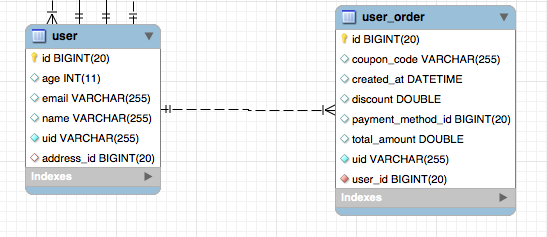Spring Data One To Many Mapping
One-To-Many relationship is used widely in database operations. For exampel a user can have multiple cars or a user can have multiple computer screens to work with.
Our example is a user can have multiple orders as in a restaurant order. Let’s suppose you are asked to develop a pizza restaurant application where customers can order online. a User can have multiple orders.

One-To-Many Bidirectional Relationship
// On the parent side which is the User class. @OneToMany(mappedBy="user",cascade=CascadeType.ALL,fetch=FetchType.EAGER) private Set<Order> orders;
// On the child side which is the Order class. @ManyToOne(fetch = FetchType.EAGER) @JoinColumn(name = "user_id", nullable=false) private User user;
package com.lovemesomecoding.user;
import java.io.Serializable;
import java.util.HashSet;
import java.util.Set;
import javax.persistence.CascadeType;
import javax.persistence.Column;
import javax.persistence.Entity;
import javax.persistence.FetchType;
import javax.persistence.GeneratedValue;
import javax.persistence.GenerationType;
import javax.persistence.Id;
import javax.persistence.JoinColumn;
import javax.persistence.OneToMany;
import javax.persistence.OneToOne;
import javax.persistence.Table;
import org.apache.commons.lang3.builder.EqualsBuilder;
import org.apache.commons.lang3.builder.HashCodeBuilder;
import org.apache.commons.lang3.builder.ToStringBuilder;
import com.fasterxml.jackson.annotation.JsonIgnoreProperties;
import com.fasterxml.jackson.annotation.JsonInclude;
import com.fasterxml.jackson.annotation.JsonInclude.Include;
import com.lovemesomecoding.order.Order;
@JsonInclude(value = Include.NON_NULL)
@Entity
@Table(name = "user")
public class User implements Serializable {
private static final long serialVersionUID = 1L;
@Id
@GeneratedValue(strategy = GenerationType.IDENTITY)
@Column(name = "id", nullable = false, updatable = false, unique = true)
private Long id;
@Column(name = "uid", unique = true, nullable=false, updatable=false)
private String uid;
@Column(name = "name")
private String name;
@Column(name = "email")
private String email;
@Column(name = "age")
private int age;
@JsonIgnoreProperties(value= {"user"})
@OneToMany(mappedBy = "user", cascade=CascadeType.ALL, fetch=FetchType.EAGER)
private Set<Order> orders;
public User() {
super();
// TODO Auto-generated constructor stub
}
// getters and setters
public void addOrder(Order order) {
if(this.orders == null){
this.orders = new HashSet<>();
}
this.orders.add(order);
}
}
package com.lovemesomecoding.order;
import java.io.Serializable;
import java.time.LocalDateTime;
import java.util.Date;
import javax.persistence.Column;
import javax.persistence.Entity;
import javax.persistence.FetchType;
import javax.persistence.GeneratedValue;
import javax.persistence.GenerationType;
import javax.persistence.Id;
import javax.persistence.JoinColumn;
import javax.persistence.ManyToOne;
import javax.persistence.Table;
import javax.persistence.Temporal;
import javax.persistence.TemporalType;
import org.apache.commons.lang3.builder.EqualsBuilder;
import org.apache.commons.lang3.builder.HashCodeBuilder;
import org.apache.commons.lang3.builder.ToStringBuilder;
import org.hibernate.annotations.CreationTimestamp;
import com.fasterxml.jackson.annotation.JsonIgnoreProperties;
import com.fasterxml.jackson.annotation.JsonInclude;
import com.fasterxml.jackson.annotation.JsonInclude.Include;
import com.lovemesomecoding.user.User;
@JsonInclude(value = Include.NON_NULL)
@Entity
@Table(name = "user_order")
public class Order implements Serializable {
private static final long serialVersionUID = 1L;
@Id
@GeneratedValue(strategy = GenerationType.IDENTITY)
@Column(name = "id", nullable = false, updatable = false, unique = true)
private Long id;
@Column(name = "uid", unique = true, nullable=false, updatable=false)
private String uid;
@Column(name = "coupon_code")
private String couponCode;
@Column(name = "discount")
private Double discount;
@Column(name = "total_amount")
private Double totalAmount;
@Column(name = "payment_method_id")
private Long paymentMethodId;
@CreationTimestamp
@Column(name = "created_at")
private Date createdAt;
@JsonIgnoreProperties(value= {"orders"})
@ManyToOne(fetch = FetchType.EAGER)
@JoinColumn(name = "user_id", nullable=false)
private User user;
public Order() {
super();
// TODO Auto-generated constructor stub
}
// setters and getters
}
One-To-Many Unidirectional Relationship
It depends on the needs you might have. If you need to access orders from the User class then you use this below:
// On the parent side(User class) @OneToMany(cascade=CascadeType.ALL, fetch=FetchType.EAGER) private Set<Order> orders;
or if you need to access a user from the Order class then your use this below:
// On the child side(Order class) @ManyToOne(fetch = FetchType.EAGER) @JoinColumn(name = "user_id", nullable=false) private User user;
My preference and what I recommend is to use bidirectional. Using unidirectional will slow down your system as it creates an extra join for the
Use mappedBy on the @OneToMany otherwise, it will create a reference or associative table.
@JoinColumn is always on the owing side or the child side of the relationship.